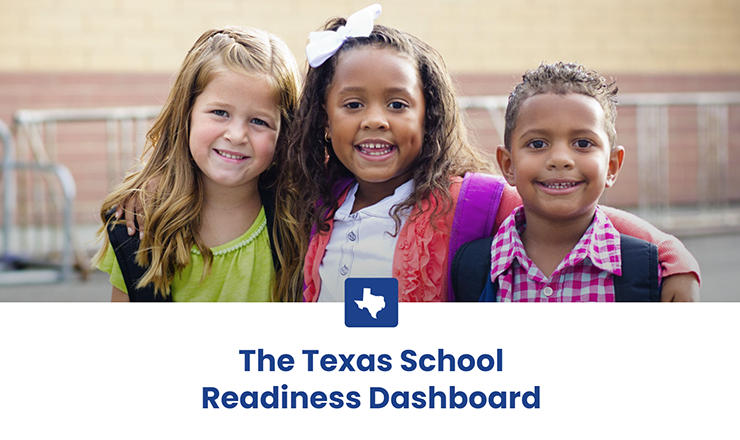Just like that, we find ourselves 3 months into the 2024 legislative sessions! In this month’s post, we cover legislative trends in five prenatal-to-3 policy areas we’re tracking across multiple states. Some efforts are near the finish line, and others are navigating roadblocks.
As of April 1, legislatures in 12 states have adjourned their 2024 sessions. Though most state general assemblies opened in January and February, Louisiana and Pennsylvania recently kicked off their sessions in March, and both Arkansas and North Carolina will convene later this month.
Early Care and Learning
So far this year, our coverage of early care and learning has focused on legislation related to the child care subsidy system, including an increase in efforts to make child care employees categorically eligible for subsidies. This month, we highlight four distinct trends across states. These trends range from major reforms to the overall child care system to more detailed changes to state subsidy eligibility and reimbursement.
- Governance: In at least five states (Illinois, Kansas, New Hampshire, New Jersey, and Rhode Island), lawmakers proposed bills to establish a new department, office, or division to consolidate early childhood services under one umbrella.
- Attendance-based reimbursements: Lawmakers in at least nine states (Colorado, Massachusetts, Maine, Missouri, Nebraska, New Jersey, Oklahoma, Virginia, and West Virginia) introduced bills to shift provider reimbursements from an attendance-based to an enrollment-based model. These bills would ensure state compliance with the new federal Child Care and Development Fund rule.
- Child support compliance: Last year, Mississippi eliminated the requirement of child support compliance for accessing child care subsidies. This year, Michigan implemented a similar measure through a new administrative rule. Lawmakers in South Dakota and Rhode Island introduced H.B. 1223 and S.B. 2459, respectively, which would also remove this requirement. Child support compliance requires single parents to jump through many hoops, in some cases multiple legal proceedings and the establishment of parentage through genetic testing, before accessing subsidies. Removing this barrier may allow more children to become eligible.
- Cost-sharing programs: Lawmakers in at least ten states (Connecticut, Hawaii, Massachusetts, Missouri, New Jersey, Pennsylvania, Tennessee, Virginia, West Virginia, and Wisconsin) introduced bills to create child care cost-share programs to improve affordability for families. These programs would require employers, employees, and the state to cover a portion of child care expenses.
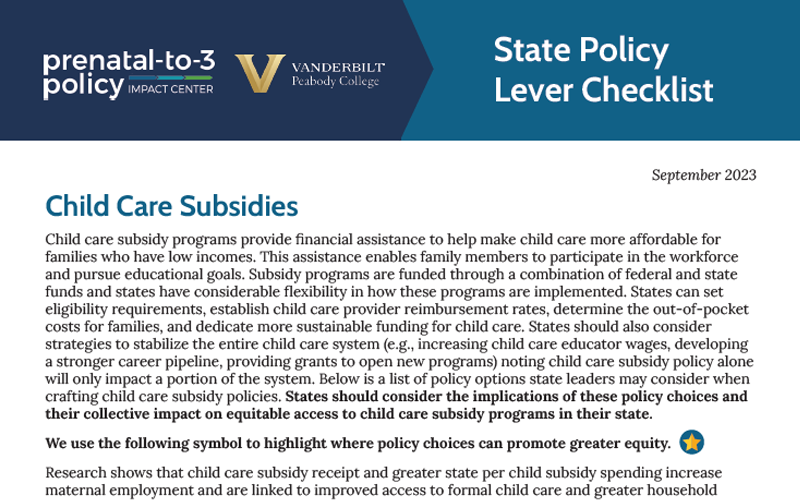
Our State Policy Lever Checklist for child care subsidies covers program provisions that help increase access and affordability.
State Earned Income Tax Credits
We continue to witness a growing interest in state earned income tax credits (EITCs), even among states without an income tax. Now that Pennsylvania lawmakers have returned from recess, they will resume consideration of two similar bills, H.B. 1272 and S.B. 848, carried over from the previous session. These bills would create a refundable EITC worth 25% of the federal credit. Mississippi also considered H.B. 544, which would have established a refundable state EITC worth 10% of the federal credit. The bill, however, died in committee.
It appears that when Washington state, where there is no income tax, found a way to implement an EITC in 2022, it may have started a nationwide trend. States without an income tax can offer these credits to families through checks or direct payments. Both Florida and Tennessee, which lack a state income tax, introduced legislation to establish a refundable state EITC this year.
Florida’s H.B. 1601/S.B. 1570 would have established a credit worth 20% of the federal EITC, but failed to pass before the session’s end. Tennessee is still considering companion bills H.B. 2942/S.B. 1813 to establish a credit based on the number of dependents, similar to the Washington State Working Families Tax Credit.
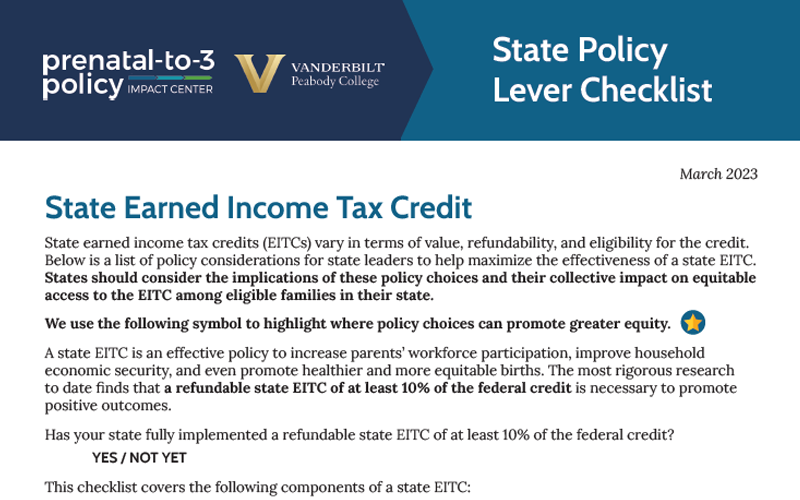
Our State Policy Lever Checklist helps lawmakers make effective and equitable decisions about EITC components, such as eligibility and funding.
Community-Based Doulas
In the past month, Washington Governor Jay Inslee signed S.B. 5950, successfully extending Medicaid coverage for doulas. As a result, the state will provide a reimbursement rate of $3,500 per client, the most generous of any state, starting in January 2025.
Additional bills we’re tracking include:
- Private insurance: Virginia, Colorado, and Illinois each introduced legislation this year requiring private insurance coverage for doula services. Notably, Virginia’s governor has until April 8 to sign S.B. 118 or it automatically becomes law.
- Medicaid coverage: Missouri lawmakers introduced two bills, H.B. 2671 and H.B. 2654, relating to Medicaid coverage of doula services. Reimbursement rates would be at least $1,500 per client. Vermont S. 109 would also require Medicaid coverage for doula services. The bill successfully cleared the senate and is currently under review by a house committee.

Spots are filling up for our July 10-12 Community-Based Doula Policy Learning Symposium! We encourage legislative staff at any level to apply, regardless of job, position, or party.
State Minimum Wage
Several states are advancing proposals to guarantee fair wages for all workers. This month, we highlight efforts to eliminate subminimum wages for incarcerated workers, workers with disabilities, and tipped workers. These policies exacerbate inequalities and lead to widespread financial hardship and unstable income—particularly for women, and disproportionately women of color.
- Incarcerated workers: Arizona S.B. 1712 would require that incarcerated workers receive at least the state minimum wage. This legislation would provide a significant financial boost, because most incarcerated individuals in the state currently receive less than $1.50 per hour. Wages earned by incarcerated individuals are allocated to their trust accounts, where they can request withdrawals for approved purposes, while deductions (e.g., child support, filing fees, restitution) are drawn from the account.
- Workers with disabilities: Georgia H.B. 1125 would gradually phase out and eliminate the subminimum wage for workers with disabilities. After passing the house, the bill was voted favorably out of a senate committee.
- Tipped minimum wage: Connecticut S.B. 221 would gradually increase the tipped minimum wage , which would eliminate the practice of counting gratuities towards the base wage for tipped workers.
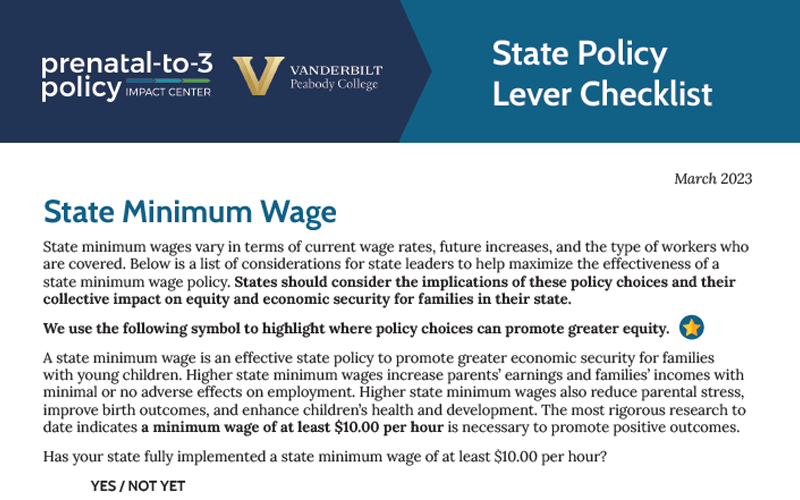
Our State Policy Lever Checklist includes considerations for special populations, as well as other important components of a state minimum wage.
Expanded Eligibility for Health Insurance
In our March update, we reported on Idaho’s efforts to extend Medicaid coverage to 12 months following birth. The bill has now been signed into law, making Idaho the 48th state to extend Medicaid coverage from 60 days to 12 months postpartum.
In Kansas, public hearings were held for the first time in 4 years on H.B. 2556, a crucial Medicaid expansion bill. Kansas would have become the 42nd state to adopt Medicaid expansion, but the bill was voted down in committee.
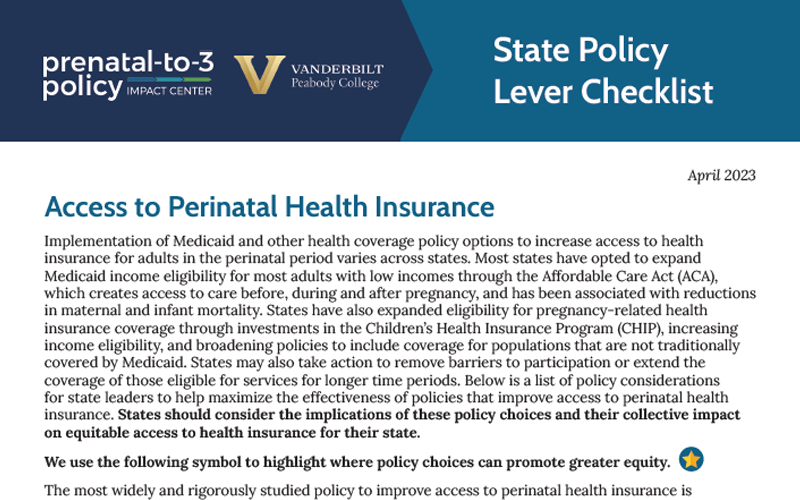
Our State Policy Lever Checklist contains a list of considerations for state leaders to consider to maximize access to perinatal health insurance.
These updates provide just a sample of the legislation introduced so far in the 2024 session. As our team continues to track state activity for our 12 evidence-based policies, we will continue to post monthly state policy updates on our blog through June. Sign up for our newsletter and blog email updates and follow us on social media to stay up to date as 2024 legislative sessions progress.


